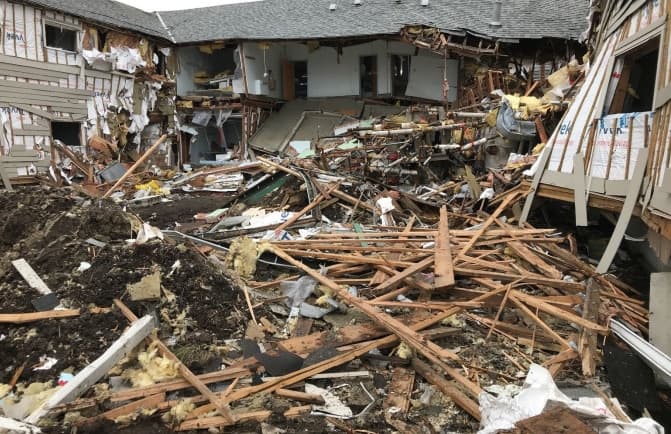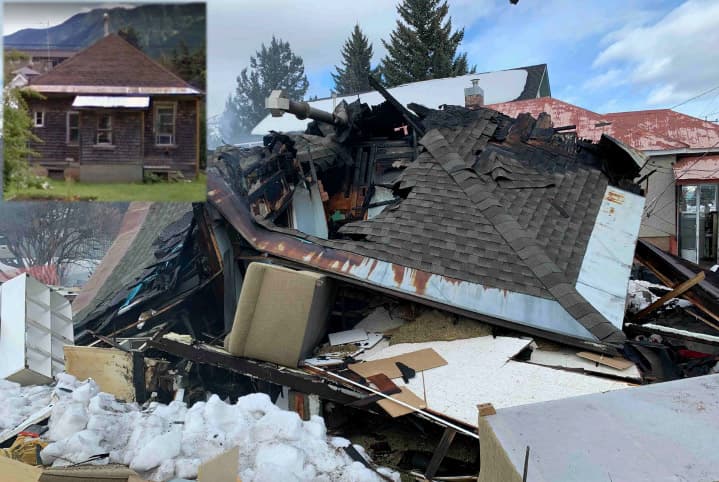Gas Line Strikes
Annual State of Safety 2022
Raising Awareness of a Troubling Trend
Each year in British Columbia, there are hundreds of incidents where buried gas lines and utilities are damaged by homeowners or contractors who are excavating or digging, despite having called before they dig to check for gas lines. In most cases, these gas line strikes result in merely simple gas leaks that, if identified early, can be repaired without further complications.
However, in 2022, we investigated two serious incidents that occurred in Comox in November 2021 and Fernie in February 2022. Both incidents involved gas line strikes that resulted in explosions causing extensive damage to buildings and infrastructure, and injuries to a total of 30 people. Our investigations showed that the individuals conducting the work may not have understood the risks or potential consequences of damaging underground gas lines and could have done more to mitigate the danger once the gas lines were exposed.
24
Investigations into reports of gas leaks from damaged gas lines
7
Investigations into explosions from potential gas leaks
31
Injuries resulting from gas leaks due to damaged gas lines
Comox Gas Explosion: Multiple Injuries Due to Underestimation of Danger
In November 2021, crews were digging in close proximity to exposed gas lines at the Canadian Forces Base in Comox, BC. An exposed underground gas line was struck by an excavator while installing a new perimeter drain around the occupied military barracks building which was under exterior renovation. The punctured gas line leaked gas into the building where it contacted a source of ignition, resulting in a major explosion that destroyed the barracks building, injuring 28 people.
Our investigation found that prior to digging near the exposed gas line, there was no assessment done to anticipate an accidental gas release or to identify risk factors such as possible gas migration into the building, building occupancy at the time of the work, or potential ignition sources in the area. There was misunderstanding of the possible consequences of gas migrating into the building, and the likelihood of it being ignited and exploding.
Our Incident Investigations team concluded that nearly half of all gas line hits in British Columbia occurred despite workers taking initial precautions, such as calling BC 1 Call before digging. After this frightening incident, we used every channel possible to educate clients and the public to ensure they understand the risk involved with digging near gas lines, as well as the precautions that they should take once gas lines are exposed.

East side of barracks building after the incident.
"Nearly half of all gas line hits in British Columbia occurred despite workers taking initial precautions, such as calling BC 1 Call before digging."
Fernie Gas Explosion: Shedding Light on Common Misconceptions
Despite the relatively high profile of the Comox gas explosion, an incident in Fernie occurred just three months later. A crew was installing a water line using an excavator and struck an exposed gas line. Escaping gas from the damaged gas line migrated underground and into a home through building openings, where it contacted a source of ignition, resulting in a large explosion and subsequent fire. This frightening incident led to two minor injuries.
Like the Comox incident, A BC 1 ticket had been obtained prior to beginning work and the location of the gas line was known. However, there was no emergency plan in place in the case of an accidental gas release, and no one had anticipated the potential ignition sources nearby. When the homeowner noticed the smell of gas in the air after the line was struck, they shut off the gas hot water heater and electrical switch to the gas furnace, but unfortunately had not checked to see whether anyone was in the home at the time. By this time, gas had already found its way into the building and before the occupant or homeowner could exit, ignited, resulting in an explosion that partially collapsed the roof and blew out the walls of the home.
When interviewed, the excavator operator and homeowner indicated they didn’t think they were working in a dangerous way and demonstrated a limited understanding of the considerable risk involved when working with flammable gas. While thankfully no one was seriously injured in this incident, the explosion illustrates a serious misconception of the danger involved when working in close proximity to gas lines.
This incident, coupled with the Comox incident just a few months beforehand, illustrated an opportunity for us to take action to increase awareness and education about gas line hits.

The home before and after the explosion and fire.
"The explosion illustrates a serious misconception of the danger involved when working in close proximity to gas lines."
Building Capability in Our Safety System
The similarities between these two incidents underscore the need for more education and awareness about the risks of working near exposed gas lines and the potential for danger. Many people know to “call before you dig,” but it's important to understand what precautions need to be taken before digging, during excavation, and once a gas line is exposed.
In order to support widespread distribution of these two incident reports, we informed the media and public of our findings and recommendations through a news release, resulting in extensive coverage both regionally and nationally. We also published a list of safety guidance tips and educational resources that we continue to promote today.
To educate British Columbians on the risks associated with digging near gas lines, we also worked with our safety partners at the Common Ground Alliance to amplify the training programs available for ground disturbance and safe digging. We also presented our investigation findings at an industry conference, sharing tips with industry members on how to avoid associated safety risks.
We will continue to remind workers and homeowners that the operation of mechanical excavators near gas lines close to buildings should be avoided unless:
- The risk of explosion has been completely assessed, and additional steps have been taken to mitigate the risk and impact if a gas line is hit.
- Those who are digging pay close attention to where they are digging and any structures that may be nearby.
- Those on-site are aware of the dangers of an exposed gas line and ensure they are working safely around it.
- Extra precautions are taken before and after a gas line is exposed. It’s important to have a plan in place should there be a gas leak or explosion after the gas line has been exposed.
You Might Be Interested In
Building Confidence
We identify risks and increase safety by investigating and auditing companies without proper licenses and qualifications.
Learn MoreSafety Engagement
We provide technical training and education to support our partners. We also work to influence people in the safety system to make safety-minded decisions.
Learn MoreData and Trends
Learn about safety trends, analysis and emerging risks for each of the technologies TSBC oversees.
Learn More